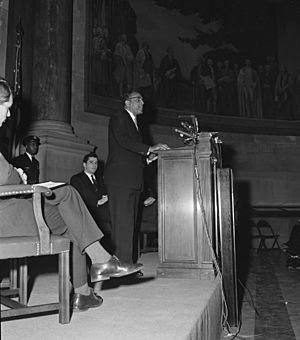Charles H. Wesley facts for kids
Quick facts for kids
Charles H. Wesley
|
|
|---|---|

Charles H. Wesley at the Opening of the Emancipation Proclamation Exhibit
|
|
| Born | Charles Harris Wesley December 2, 1891 Louisville, Kentucky, U.S. |
| Died | August 16, 1987 (aged 95) District of Columbia |
| Occupation | Historian, Author |
| Period | 1925–1987 |
| Genre | History |
| Notable works | Prince Hall Life and Legacy |
| Spouse | Louise Johnson (d. 1973) Dorothy B. Porter (1977–1987) |
| Children | Louise J. Wesley (d. 1950), Charlotte Wesley Holloman |
Charles Harris Wesley (December 2, 1891 – August 16, 1987) was a very important American historian, teacher, and writer. He also served as a minister. Wesley wrote more than 15 books about African-American history. He taught for many years at Howard University. He also led two universities in Ohio: Wilberforce University and Central State University.
Contents
Early Life and Education
Charles Wesley was born in Louisville, Kentucky. He was the only child of Matilda and Charles Snowden Wesley. He went to local schools when he was young. In 1911, he graduated from Fisk University in Nashville, Tennessee. This was a historically black college.
Wesley continued his studies. He earned a master's degree from Yale University in 1913. Later, in 1925, he made history. He became only the third African American to earn a PhD from Harvard University.
Career and Leadership
Charles Wesley became an ordained minister. He served in the African Methodist Episcopal Church (AME). He also had a long career as a history professor. He wrote many books on African-American history and politics. At Howard University, he was the Dean of Liberal Arts and the Graduate School.
In 1931, Wesley received a special award called a Guggenheim Fellowship. This allowed him to travel to London, England. There, he helped start the League of Coloured Peoples. This group was inspired by the NAACP. Wesley was a member of the NAACP.
Leading Universities
In 1942, Wesley became the President of Wilberforce University. This university in Wilberforce, Ohio, was connected to the AME church. He led Wilberforce until 1947. That same year, he started a new university. It was called Central State University. It was built right across the street from Wilberforce. He was president of Central State until 1965. After that, he moved back to Washington, D.C.
Working for History
In 1965, Wesley took on a new role. He became the Director of Research and Publications for the Association for the Study of African American Life and History. He was the Executive Director from 1965 to 1972. Later, he became the Executive Director Emeritus. In 1976, he directed the Afro-American Historical and Cultural Museum in Philadelphia. Today, it is known as the African American Museum in Philadelphia. He was also a lifelong member of the American Historical Association.
Fraternal Organizations
Wesley was very active in African-American fraternal groups. These are like clubs or societies. He was elected as the 14th General President of Alpha Phi Alpha. This was the first Greek-letter fraternity for African Americans. He served five terms as president. For seven decades, he was also the National Historian for the group. He wrote The History of Alpha Phi Alpha in 1929. He updated it many times.
Wesley was also a leader in Sigma Pi Phi. This was the first Black Greek Letter Organization (BGLO). He was also a Prince Hall Freemason. He held a high rank in this group. He was also a member of the Odd Fellows and the Elks.
Charles Wesley passed away on August 16, 1987, in Washington, D.C. He was buried at Lincoln Memorial Cemetery in Suitland, Maryland.
Awards and Honors
Charles Wesley received many awards and honors during his life. Some of these include:
- Guggenheim Fellowship in 1930/31
- Phi Beta Kappa Key in 1953
- Scottish Rite Gold Medal Award in 1957
- Amistad Award in 1972
- Honorary doctorates from many universities, including Wilberforce University in 1928
Books by Charles H. Wesley
Charles Wesley was a very productive writer. He wrote many books, mostly about history.
- He wrote several books on African-American history. These covered topics like labor, the Civil War, and the fight for equality. Some examples include Negro Labor in the United States, 1850–1925 and Negro Americans in the Civil War. He also worked with Carter G. Woodson on books like Negro Makers of History.
- He also wrote histories of the fraternal organizations he was part of. This included The History of Alpha Phi Alpha and The History of Sigma Pi Phi.
- Wesley also wrote books about Prince Hall Freemasonry. One of his notable works was Prince Hall: A Life and Legacy.
- He wrote about other important organizations too. This included the History of the Improved Benevolent and Protective Order of Elks of the World.

